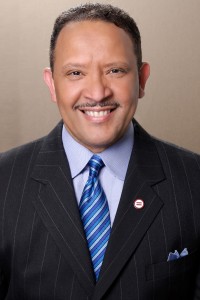Native son brings convention home
23rd July 2012 · 0 Comments
By Mason Harrison
Contributing Writer
Marc Morial rode into office nearly 20 years ago as mayor of New Orleans on the promise to “clean out City Hall with a shovel, not a broom.” The two-term mayor, who lost his bid to stay on for a third, has taken that same aggressive stance with him to New York, where he has headed the National Urban League, a century-old civil rights organization, for almost a decade. 
The son of the first Black New Orleanian to capture the “franchise,” a moniker used to describe the city’s mayoralty, Morial seems right at home, he states, at the helm of the “largest urban-based civil rights organization” in the country. “We are in the cities. We are almost exclusively in urban areas,” Morial adds, setting the organization a part from other groups with a rural presence.
Morial’s vision for the Urban League—a group arguably not as well known as another East Coast civil rights organization: the National Association for the Advancement of Colored People – has been for the group to be an integral part of what he has dubbed the “empowerment movement” to secure better access to healthcare, job security and higher levels of education for Blacks.
The Urban League, under Morial’s leadership, has set 2025 as the target date for making significant gains in the movement for empowerment. By then, Morial hopes, Blacks and others will experience “an America where there are no wealth or income disparities; where poverty is reduced to the barest minimums; where there is better civility; and where we have conquered the economic divide.”
To get there, Morial says a mix of strategies will be needed, including legal challenges to harmful public policies, raising awareness among the haves of the plight of the have-nots and continuing the discussion about what’s best for the nation. “We can’t afford to have a laissez-faire attitude when it comes to the growing economic divide,” he says. “Poverty isn’t like red beans on Monday or afternoon thunderstorms in New Orleans – it doesn’t always have to be there.”
But as much as “the powers that be” should relent in fostering discriminatory practices, Morial says, “We have tremendous work to do in our own community,” he notes, referring to Black Americans. Achieving success in the empowerment movement is a two-pronged effort, one where whites work with Blacks in beating back obstacles and Blacks work in their own neighborhoods to nurture success. This approach is necessary, Morial believes, because, “We are all linked together.”
As the city’s former mayor, Morial has observed New Orleans’ recent challenges from afar in the Urban League’s offices in Lower Manhattan while traveling the country to promote the group’s agenda.
The city is close to inking a consent decree with federal authorities over poor conduct and civil rights abuses stemming from the police department. During his tenure, Morial spearheaded efforts to root out corruption and malfeasance in the department and was lauded for his efforts.
“It is incredibly disturbing to me,” he notes, referring to the current state of affairs, “that after [the police chief] and the community fixed the problems that the reforms were dismantled. It was distressing. It happened because the leadership allowed it to happen and did not do what was necessary. Now, we have paid an incredible price in corruption, brutality and misconduct, as well as in finances and our reputation.”
But he applies a softer critique to an equally agonizing source of community frustration in New Orleans: the much-criticized public school reforms implemented in the wake of Hurricane Katrina.
“I think the verdict is out,” Morial believes, discussing the success or failure of the local charter school movement. Morial pushed for a third term, in part, in order to bring the New Orleans school system under the mayor’s purview in much the same way big-city mayors had done in New York and Chicago.
“The city would have gotten a head start on some of the current reforms had my efforts been successful,” he states. “But this isn’t about politicians, parents or teachers. It’s about the students.” Morial does add, however, that, “The way teachers were treated after Katrina was unacceptable,” noting the mass layoffs that occurred in the wake of the storm.
Morial will lead his organization during its annual conference in New Orleans in the convention center, one of the world’s largest, that bears his father’s name. The building was renamed to honor Ernest “Dutch” Morial in 1992.
“Every day I think of my father’s work,” the younger Morial says. “He was an inspiration in many, many ways. What he did for my brother and me; we went a lot of places with him. We participated in campaigns, civil rights rallies and we had a degree of exposure that was infectious.
“I am standing on his shoulders, but coming to where I am on my own. My father never encouraged or discouraged my career choices. He simply said, ‘Go where your passion is.’
“Those passions have been the law, politics and now civil rights.”
This article originally published in the July 23, 2012 print edition of The Louisiana Weekly newspaper.



